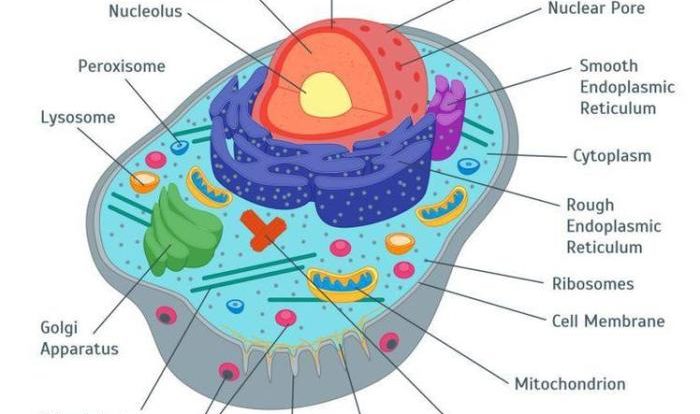The eukaryotic cell cycle and cancer answers provide a comprehensive understanding of the fundamental processes that govern cellular function and the development of cancer. This narrative delves into the intricate mechanisms that regulate cell division, uncovering the role of cell cycle dysregulation in cancer pathogenesis and exploring therapeutic strategies that target the cell cycle.
The eukaryotic cell cycle, a tightly orchestrated sequence of events, ensures the faithful duplication and distribution of genetic material during cell division. Key stages of the cell cycle, including interphase, mitosis, and cytokinesis, are meticulously described, highlighting their distinct characteristics and significance in cellular function.
Cell Cycle Regulation
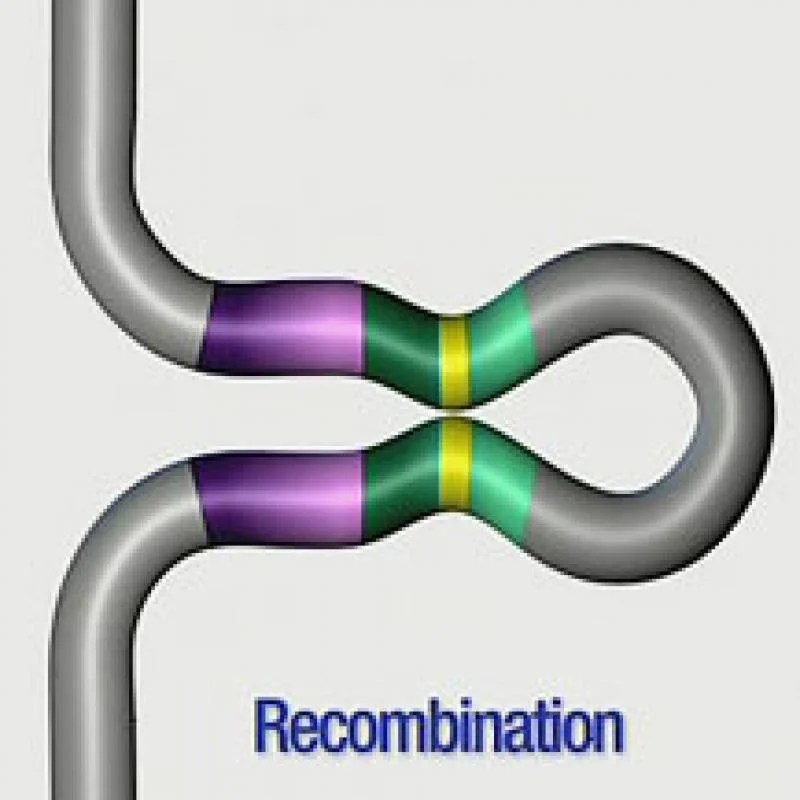
The cell cycle is a highly regulated process, ensuring the orderly progression of cells through the different stages. Key mechanisms involved in regulation include:
- Checkpoints:These control points occur at specific stages in the cell cycle, allowing the cell to assess its readiness to proceed. If conditions are not met, the cell can pause or even halt the cycle.
- Cyclins:These proteins fluctuate in concentration throughout the cell cycle, activating specific cyclin-dependent kinases (CDKs) that drive cell cycle progression.
External factors can also influence cell cycle progression. For instance, growth factors promote cell cycle entry, while stress signals can trigger cell cycle arrest or even apoptosis (programmed cell death).
Cell Cycle and Cancer
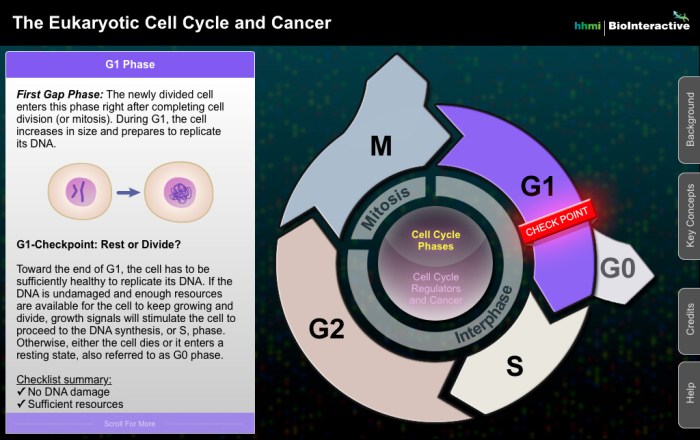
Dysregulation of the cell cycle is a hallmark of cancer. Mutations in genes encoding cell cycle regulators can lead to uncontrolled cell proliferation, a key characteristic of cancerous cells.
Specific genetic alterations that can contribute to cell cycle dysregulation in cancer include:
- Mutations in tumor suppressor genes, such as p53 and Rb, which normally inhibit cell cycle progression in response to DNA damage or other cellular stress.
- Overexpression of cyclins or CDKs, which can drive excessive cell cycle progression.
- Alterations in checkpoint proteins, leading to failure in cell cycle arrest when necessary.
Therapeutic Implications
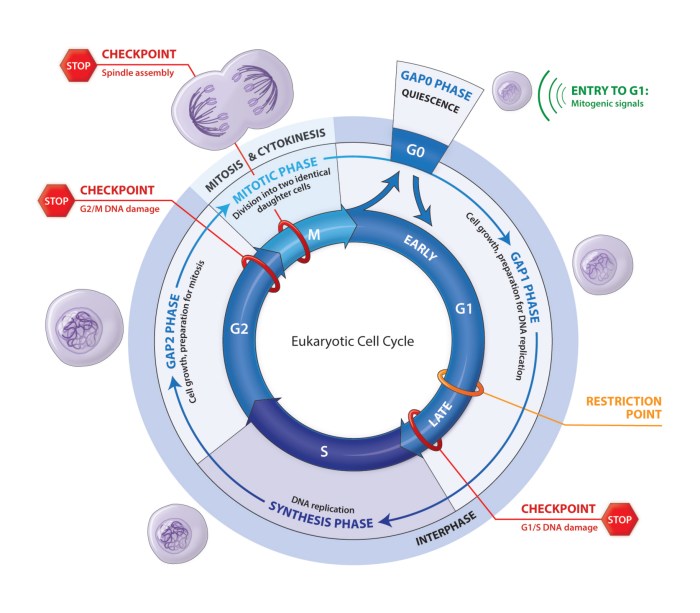
Targeting the cell cycle is a promising strategy for cancer treatment. Several classes of drugs have been developed to inhibit cell cycle progression at specific points.
These drugs include:
- Cyclin-dependent kinase (CDK) inhibitors:These drugs target specific CDKs, preventing their activation and thus halting cell cycle progression.
- Checkpoint inhibitors:These drugs block checkpoint proteins, allowing cells to proceed through the cell cycle even in the presence of DNA damage or other cellular stress.
However, cell cycle-based therapies face challenges, such as drug resistance and potential side effects. Further research is needed to improve their efficacy and selectivity.
Research Advancements: The Eukaryotic Cell Cycle And Cancer Answers
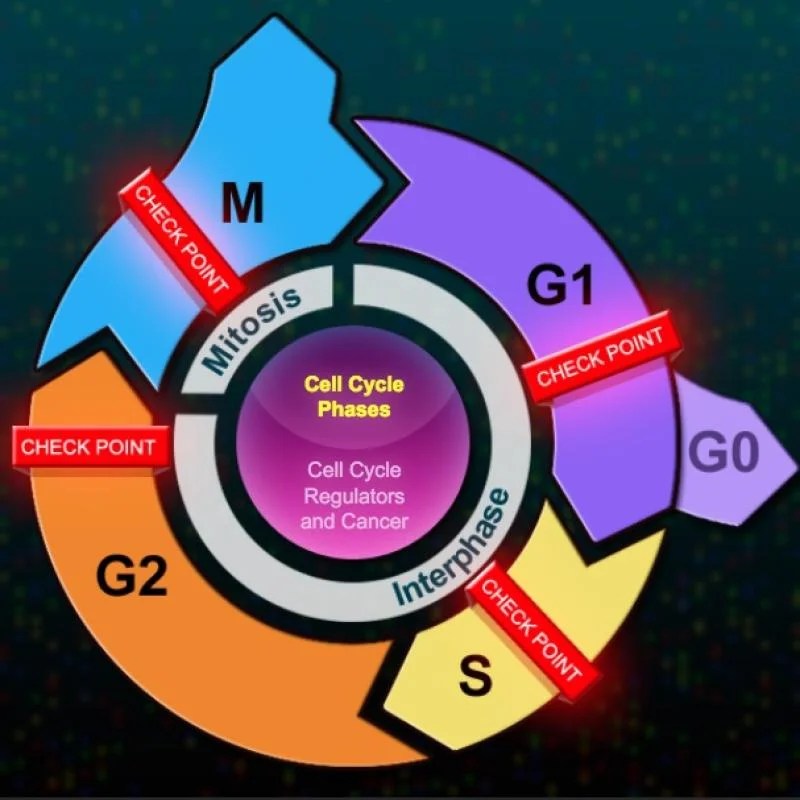
Recent advancements in understanding the cell cycle have opened up new avenues for cancer research.
Emerging technologies include:
- Live-cell imaging:Allows researchers to visualize and track cell cycle dynamics in real-time.
- Single-cell analysis:Enables the study of cell cycle progression at the individual cell level, revealing heterogeneity within cell populations.
These advancements are providing valuable insights into the complex regulation of the cell cycle and its implications for cancer development and treatment.
Question & Answer Hub
What is the significance of the eukaryotic cell cycle?
The eukaryotic cell cycle is crucial for cellular function as it ensures the faithful duplication and distribution of genetic material during cell division, allowing cells to grow, repair, and reproduce.
How does cell cycle regulation contribute to cancer development?
Dysregulation of cell cycle regulation can lead to uncontrolled cell proliferation, a hallmark of cancer. Genetic alterations and mutations can disrupt checkpoints and cyclins, leading to abnormal cell cycle progression and tumor formation.
What are the therapeutic implications of targeting the cell cycle in cancer treatment?
Targeting the cell cycle in cancer treatment offers a promising approach to inhibit uncontrolled cell proliferation. Different classes of drugs, such as cell cycle inhibitors and mitotic inhibitors, are employed to disrupt specific cell cycle stages and induce cell death in cancer cells.
